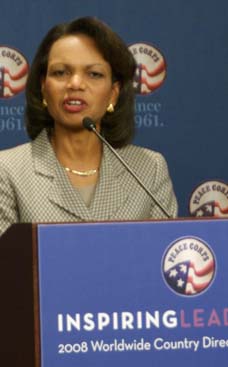
I found myself going to sleep recently considering her question: How are we responsible as individuals for asserting the values that push our culture and nation into mature and responsible behavior? Where does our influence lie? Can we parent our nation and culture into a more constructive role in the world that doesn't depend on the belief that for us to meet our needs we can afford to impoverish others? Journalist Margaret Krome served as a Peace Corps Volunteer in Cameroon.
Margaret Krome writes: Grabby America needs to grow up
Margaret Krome: Grabby America needs to grow up
Margaret Krome — 7/08/2008 5:20 am
My roommate last week, Sharon, critiques United States political and social history the way you might gossip about a badly mannered child.
"Our country just hasn't grown up," she told me. "We have a long history of being grabby. We want something, we think we ought to have it. It's like a badly parented child who doesn't see why he or she should have to wait in line, share, or consider the impact of their wishes on others."
Some of the history Sharon describes was justified by the 19th century doctrine of Manifest Destiny -- the belief that the American people were so remarkable, virtuous and thereby blessed by God that it was inevitable and preordained that the nation should extend its borders to spread its goodness, democracy and way of life. Even among the ruling classes of the mid-1800s, the doctrine was challenged by some. But, of course, for people living, protecting and depending on the natural resources of those lands, Manifest Destiny was a public relations campaign that justified invasion and appropriation of others' property.
When white settlers wanted land, the federal government moved native peoples from the land by force. When they wanted water, they took water. In April, I visited the Gila River tribe in Arizona. The lifeblood for this desert tribe had been the Gila River, which was turned off like a faucet farther north in the mountains 150 years ago when white settlers wanted its water. The tribe was forced to abandon its agricultural tradition and use government rations of highly processed flour, oil and sugar to subsist, leading to today's astronomical rate of diabetes within the tribe. In a rare example of reparations, three years ago the tribe's rights to the river's waters were finally validated after a 150-year court battle and passage of a bill in Congress to affirm a settlement.
Today, of course, the nation's oil addiction justifies invasion of Iraq and other nations with large oil reserves, always with the Manifest Pretense of spreading democracy. Notwithstanding our repeated failures to establish democracy in nations we overrun, the nation's comfort with the tradition of adventurism has permitted this history again and again.
The nation's history of we-want-it-we'll-take-it doctrine extends beyond wars, invasions, and land-grabbing, of course. The nation was built by one race that enslaved another for its economic and social convenience. This is a particularly personal history for Sharon, because it enslaved her great-grandparents and millions of other Africans brought to this country.
She is also grieved that cousins and others in her family, whose elders were leaders in the civil rights movement, are more interested in owning bigger cars and houses than in social justice. I asked if she discusses with her family ways in which the seeds of injustice are sown by insufficient examination of the supply chains meeting our needs. Or the military power required and human lives lost to protect petroleum supply chains. Or the human and ecological atrocities required to mine many basic metals and chemicals.
"They can't afford to think about it," she said. "It would undermine everything in their lives."
All week I've found myself pondering Sharon's assessment of our nation's and culture's historic and ongoing transgressions as a form of childishness. I recognize the dangers of describing collective social trends in inappropriate interpersonal terms. Yet historians sometimes see collective behavior in just such terms. In "A Distant Mirror: The Calamitous 14th Century," Barbara Tuchman describes the impulsiveness that both resulted from and created the youthful, emotionally rigid chivalric orders of the day. She notes the lack of nurture and restraint as one of the seeds of the dangerous and inhuman wars and social atrocities of that century.
A friend of Sharon's joined our continuing dialogue and took exception to the phrase, "We just haven't grown up." Who is "we," she wanted to know. She pointed out that she, herself, had not invaded or supported invading Iraq. She opposes drilling in ANWR, supports U.S. aid for medical care in developing countries, and in general believes she considers the needs of others than herself. So what's her role as an individual in asserting values of respect for other peoples, nations, future generations, and other species on the Earth?
I found myself going to sleep recently considering her question: How are we responsible as individuals for asserting the values that push our culture and nation into mature and responsible behavior? Where does our influence lie? Can we parent our nation and culture into a more constructive role in the world that doesn't depend on the belief that for us to meet our needs we can afford to impoverish others?
Margaret Krome of Madison writes a semimonthly column for The Capital Times.









